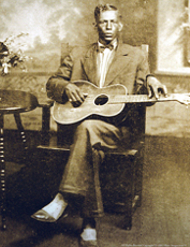
Tommy Johnson (1896 – November 1, 1956) was an influential American delta blues musician who recorded in the late 1920s, known for his eerie falsetto voice and intricate guitar playing.
Johnson was born near Terry, Mississippi, and moved around 1910 to Crystal Springs where he lived for most of his life. He learned to play the guitar and, by 1914, was supplementing his income by playing at local parties with his brothers Mager and LeDell. In 1916 he married and moved to Webb Jennings' Plantation near Drew, Mississippi, close to the Dockery Plantation. There he met other musicians including Charlie Patton and Willie Brown.By 1920 he had become an alcoholic and itinerant musician, based in Crystal Springs but travelling widely around the South, sometimes accompanied by Papa Charlie McCoy. In 1928 he made his first recordings with McCoy for Victor Records. The recordings included "Canned Heat Blues", in which he sang of drinking methanol from the cooking fuel Sterno. The song features the refrain "canned heat, mama, sure, Lord, killing me." The blues group Canned Heat took their name from this song. Johnson's "Big Road Blues" inspired Canned Heat's song, "On the Road Again". A significantly different version of the song appears as "Canned Heat" on the Big Road Blues album by K. C. Douglas.
He recorded two further sessions, in August 1928 and for Paramount Records in December 1929. He did not record again, mistakenly believing that he had signed away his right to record . This resulted on a legal settlement with The Mississippi Sheiks who had used Johnson's 'Big Road Blues' melody in their enormously successful "[Stop and Listen]". Johnson was party to the copyright settlement, but was too drunk at the time to understand what he had signed to.
Johnson's recordings established him as the premier Delta blues vocalist of his day, with a powerful voice that could go from a growl to a falsetto. He was also an accomplished guitarist. His style influenced later blues singers such as Robert Nighthawk and Howlin' Wolf, whose song "I Asked for Water (She Brought Me Gasoline)" was based on Johnson's "Cool Water Blues". He was a talented composer, blending fragments of folk poetry and personalized lyrics into set guitar accompaniments to craft striking blues compositions such as "Maggie Campbell.To enhance his fame, Johnson cultivated a sinister persona. According to his brother LeDell, he claimed to have sold his soul to the devil in exchange for his mastery of the guitar. This story was later also associated with Robert Johnson, to whom he was unrelated. Tommy Johnson also played tricks with his guitar, playing it between his legs and behind his head, and throwing it in the air while playing.
Johnson remained a popular performer in the Jackson area through the 1930s and 1940s, sometimes performing with Ishman Bracey. He was highly influential on other performers, partly because he was willing to teach his style and his repertoire.He died of a heart attack after playing a party in 1956. He is buried in the Warm Springs Methodist Church Cemetery outside of Crystal Springs, Mississippi. In 2001 a headstone was commissioned through the Mt. Zion Memorial Fund, a Mississippi non-profit corporation, by the family of Tommy Johnson and paid for by musician Bonnie Raitt.

